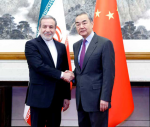You are here
Two troubling trends
Mar 08,2018 - Last updated at Mar 08,2018
Until less than a decade ago, we in the Arab world thought we put colonialism behind us. Now we are not so sure.
By the 1960s, essentially all Arab countries obtained their independence from colonising European powers, and national governments emerged.
Some have always questioned the degree of independence, since many Arab countries remained dependent on those powers, some even for political and economic sustenance.
Nevertheless, independence was official, and in a sense real, and by and large, Arab countries acted like independent states. Some, in the post-independence era, even challenged and opposed those powers.
Recently, however, we have started experiencing what some think is not just a setback, but a return of colonial hegemony, perhaps even occupation.
Syria, Libya, Yemen and even Iraq furnish concrete examples of major and minor foreign powers, some directly and some through proxy groups of sorts, flagrantly violating the sovereignty of several Arab countries and interfering in their internal politics, militarily and disastrously.
The so-called Arab spring, which has come to mean inter-Arab rivalry on the one hand and foreign interference in Arab affairs on the other, seems to have brought colonialism back.
All of this is well-known.
What is probably less well-known, but equally worrisome, is what one may call exaggerated fascination by several Arab countries of former colonial foreign powers.
There is no problem whatsoever with Arab countries engaging economically, politically and culturally etc. with all countries in the world, including former and current colonial powers, as long as these relations have real mutual interest in mind and are honourable and equitable.
As a matter of fact, countries are expected and encouraged to do so.
The problem occurs, however, when the relationship is not equitable and when those hegemonic powers appear to be manipulating the relationship, or having the lion's share, for presumed "friendship" or "alliance".
Arab "magnanimity" and "generosity" can be misunderstood and misplaced, and there is nothing but shrewd mutual interest in politics.
Many are afraid that, in this unchecked openness to Eastern and Western powers, we are unwittingly beginning to enter a new, nasty neocolonial phase.
Tragically, we seem to be trading the postcolonial phase, after decades of resistance and struggle, for the colonial or neocolonial.
Many see this unholy development in politics and economics.
But many of us are beginning to see it also in other spheres.
Take higher education as an example.
Once upon a time, all Arab countries had (many still have) strong national higher educational institutions, community colleges and universities.
As of the late 1990s, and due to the influence of globalisation, many Arab universities, which had, till then, largely functioned within national and regional contexts, started opening up more speedily to global engagement.
In principle, this trend is not only desirable but necessary. Higher educational institutions must engage with the world and must take their international collaboration seriously.
Incorporating best international practices, exchanging students and faculty with other institutions, collaborating on joint projects with renowned world researchers and offering joint programmes with world-class universities, etc. are all welcome and important.
Nevertheless, many of us have started seeing the same troublesome trend spoken of above, a colonial, neocolonial dimension to the relationship.
The matter started by some big players in higher education opening campus branches in several Arab countries, under the context or pretext of globalisation.
At first, we thought this to be fine: it is a small world after all; and quite borderless. Also since we send our children to these universities in their home countries, having them at our doorstep might be a good idea, even though there is loss of the cultural context, which is so valuable to our children.
Furthermore, the presence of renowned international campuses in our midst has, to some extent, created a sense of competition, compelling our universities to start taking the matter of quality more seriously.
And this is positive.
On the negative side, some of these branch campuses have proved to be far from outstanding or excelling, and they graduate students with low quality education and suspect degrees.
So while, in principle, bringing a reputable world university to the region through a branch campus is a good idea, some opportunists have started bringing unreputable universities under the illusion that they are reputable.
We in Jordan, in fact, have had an experience or two with those branch campuses, and they ended up being failed projects.
The good news at this end is that there are reliable rankings these days which enable ministries to check the standing of any foreign university fairly reliably.
However, there are two potentially worrying trends. The first is the expansion of these "reputable" universities to the degree that they become invaders, in the literal and metaphoric sense of the world.
One is detecting a lot of fascination by many stakeholders in our part of the world, including both governmental arms and private investors, with attracting more campuses, at the expense of giving our universities the support they need in order to compete and excel.
In other words, these stakeholders seem to be more fascinated, even bewitched, about investing more in reputable branch campuses than in home-grown campuses. And this is a problem.
It is not a matter of either or, as we can work in parallel: but in a carefully-planned and balanced way.
The second is that several of our home-grown universities, but especially the private ones, are fascinated with "partnering" with "international" universities — through joint or hosted programs — without either checking the quality of these programmes or bothering about the equity or equitability of the relations.
It is a "joint" programme with an "international" university.
And this is also bad.
In a nutshell, we are all for opening ourselves to the world politically, economically, culturally and educationally. But we should do so as respected, equitable partners, and not as subservient or peripheral participants.












